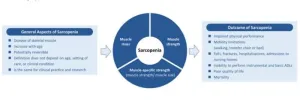(Press-News.org) New research led by UCLA Health confirms that both Tai Chi and cognitive behavioral therapy can reduce insomnia in breast cancer survivors but also may provide additional health benefits by reducing inflammation and bolstering anti-viral defenses.
Chronic insomnia is one of the most prominent symptoms experienced among cancer survivors and poses significant health concerns, including the risk of inflammatory disease that could increase the risk of cancer recurrence.
About 30% of breast cancer survivors are reported to have insomnia, which is twice the rate of the general population. While previous research has shown cognitive behavioral therapy and mind-body interventions such as Tai Chi are effective at treating insomnia among breast cancer survivors, less is known about their effectiveness in reversing inflammation caused by insomnia.
The new study, published in the journal Brain, Behavior, and Immunity this month, compared the two therapies among 90 breast cancer survivors using blood samples over 15 months to analyze changes in inflammation biomarkers.
Researchers found Tai Chi specifically led to more significant, sustained reduction in inflammation among participants compared to cognitive behavioral therapy. By comparison, cognitive behavioral therapy participants had greater anti-viral gene transcripts, which potentially improve the body’s defenses against infections.
“Tai Chi can be readily provided in community settings, with minimal cost, and can treat insomnia in adults, older adults and cancer survivors,” said Dr. Michael Irwin, the study’s lead author and professor at UCLA Health’s Department of Psychiatry and Biobehavioral Sciences. “Further, Tai Chi, as compared to cognitive behavioral therapy, has additional advantage in reducing inflammation in breast cancer survivors.”
The study relied on blood samples taken from breast cancer survivors from a 2017 study, also led by Irwin, that examined the effectiveness of Tai Chi versus cognitive behavioral therapy in insomnia treatment and remission. Blood samples were collected from 2008 to 2012 from the 90 participants from the Los Angeles area prior to treatment and at 2-, 3-, 6- and 15-month intervals. Researchers evenly split participants to either undergo weekly Tai Chi or cognitive behavioral therapy sessions lasting 120 minutes for a three-month period.
Analyses of the blood samples taken at the 15-month interval showed Tai Chi participants had reduced cellular and genomic markers of inflammation, specifically in plasma interleukin-6, TLR-4 stimulated monocyte production of inflammatory cytokines and inflammatory transcriptional profiles. Blood samples from the cognitive behavioral therapy showed greater increases in anti-viral gene transcripts.
“Effective treatment of insomnia has potent impacts on the immune system,” said Irwin, who also directs UCLA Health’s Mindful Awareness Research Center. “Tai Chi preferentially reduces inflammation as compared to cognitive behavioral therapy, whereas cognitive behavioral therapy preferentially improves antiviral viral immunity or resistance to infectious disease. Further research that examines the combined benefit of Tai Chi and cognitive behavioral therapy is needed, especially in cancer survivors who are at risk for inflammatory disorder as well as infectious disease.”
There were several limitations in the study and further studies are needed to test the effectiveness of these therapies across different populations. The participants were primarily white, older (ages ranging from 42-83) and had higher education. The study also excluded participants who had coexisting medical conditions. Changes in participants’ sleep-wake cycle and alignment with circadian rhythms may have also yielded these inflammatory health benefits. Additionally, access to Tai Chi may be limited in some communities and requires ongoing practice for several days per week as compared to cognitive behavioral therapy.
Ongoing research is examining the trajectories of inflammatory activation and accelerated aging in breast cancer survivors, as compared to non-cancer control women, which will identify behavioral and biological targets for prevention of depression, as well and other morbidities in cancer survivors.
Article: Tai Chi compared with cognitive behavioral therapy and the reversal of systemic, cellular and genomic markers of inflammation in breast cancer survivors with insomnia: A randomized clinical trial, Irwin et al., Brain, Behavior, and Immunity, Volume 120, 2024, Pages 159-166, ISSN 0889-1591, https://doi.org/10.1016/j.bbi.2024.05.022
New research led by UCLA Health confirms that both Tai Chi and cognitive behavioral therapy can reduce insomnia in breast cancer survivors but also may provide additional health benefits by reducing inflammation and bolstering anti-viral defenses.
Chronic insomnia is one of the most prominent symptoms experienced among cancer survivors and poses significant health concerns, including the risk of inflammatory disease that could increase the risk of cancer recurrence.
About 30% of breast cancer survivors are reported to have insomnia, which is twice the rate of the general population. While previous research has shown cognitive behavioral therapy and mind-body interventions such as Tai Chi are effective at treating insomnia among breast cancer survivors, less is known about their effectiveness in reversing inflammation caused by insomnia.
The new study, published in the journal Brain, Behavior, and Immunity this month, compared the two therapies among 90 breast cancer survivors using blood samples over 15 months to analyze changes in inflammation biomarkers.
Researchers found Tai Chi specifically led to more significant, sustained reduction in inflammation among participants compared to cognitive behavioral therapy. By comparison, cognitive behavioral therapy participants had greater anti-viral gene transcripts, which potentially improve the body’s defenses against infections.
“Tai Chi can be readily provided in community settings, with minimal cost, and can treat insomnia in adults, older adults and cancer survivors,” said Dr. Michael Irwin, the study’s lead author and professor at UCLA Health’s Department of Psychiatry and Biobehavioral Sciences. “Further, Tai Chi, as compared to cognitive behavioral therapy, has additional advantage in reducing inflammation in breast cancer survivors.”
The study relied on blood samples taken from breast cancer survivors from a 2017 study, also led by Irwin, that examined the effectiveness of Tai Chi versus cognitive behavioral therapy in insomnia treatment and remission. Blood samples were collected from 2008 to 2012 from the 90 participants from the Los Angeles area prior to treatment and at 2-, 3-, 6- and 15-month intervals. Researchers evenly split participants to either undergo weekly Tai Chi or cognitive behavioral therapy sessions lasting 120 minutes for a three-month period.
Analyses of the blood samples taken at the 15-month interval showed Tai Chi participants had reduced cellular and genomic markers of inflammation, specifically in plasma interleukin-6, TLR-4 stimulated monocyte production of inflammatory cytokines and inflammatory transcriptional profiles. Blood samples from the cognitive behavioral therapy showed greater increases in anti-viral gene transcripts.
“Effective treatment of insomnia has potent impacts on the immune system,” said Irwin, who also directs UCLA Health’s Mindful Awareness Research Center. “Tai Chi preferentially reduces inflammation as compared to cognitive behavioral therapy, whereas cognitive behavioral therapy preferentially improves antiviral viral immunity or resistance to infectious disease. Further research that examines the combined benefit of Tai Chi and cognitive behavioral therapy is needed, especially in cancer survivors who are at risk for inflammatory disorder as well as infectious disease.”
There were several limitations in the study and further studies are needed to test the effectiveness of these therapies across different populations. The participants were primarily white, older (ages ranging from 42-83) and had higher education. The study also excluded participants who had coexisting medical conditions. Changes in participants’ sleep-wake cycle and alignment with circadian rhythms may have also yielded these inflammatory health benefits. Additionally, access to Tai Chi may be limited in some communities and requires ongoing practice for several days per week as compared to cognitive behavioral therapy.
Ongoing research is examining the trajectories of inflammatory activation and accelerated aging in breast cancer survivors, as compared to non-cancer control women, which will identify behavioral and biological targets for prevention of depression, as well and other morbidities in cancer survivors.
Article: Tai Chi compared with cognitive behavioral therapy and the reversal of systemic, cellular and genomic markers of inflammation in breast cancer survivors with insomnia: A randomized clinical trial, Irwin et al., Brain, Behavior, and Immunity, Volume 120, 2024, Pages 159-166, ISSN 0889-1591, https://doi.org/10.1016/j.bbi.2024.05.022
END
Tai Chi reduces risk of inflammatory disease, treats insomnia among breast cancer survivors
UCLA Health researchers say combination of mind-body practices with behavioral therapy provide complementary health benefits
2024-06-26
ELSE PRESS RELEASES FROM THIS DATE:
Technology presented for measuring carbon in media, advertising and generative AI
2024-06-26
Measuring energy consumption derived from digital activity from a scientific point of view is the challenge faced by Hiili, S.L., a company recently formed and driven by two researchers from the Universidad Carlos III de Madrid (UC3M), Ángel and Rubén Cuevas Rumín, from the Telematics Engineering Department. Specifically, they develop technological solutions that combine Internet measurement techniques and Artificial Intelligence (AI) to make an accurate estimate of the energy consumption of a company's ...
Do people who exercise more have a lower risk of ALS?
2024-06-26
EMBARGOED FOR RELEASE UNTIL 4 P.M. ET, WEDNESDAY, JUNE 26, 2024
MINNEAPOLIS – Moderate levels of physical activity and fitness may be linked to a reduced risk of amyotrophic lateral sclerosis (ALS) later in life, according to a new study published in the June 26, 2024, online issue of Neurology®, the medical journal of the American Academy of Neurology. The study only found an association between physical activity and risk of ALS in male participants, not female participants.
ALS is a rare, progressive neurodegenerative disease that affects nerve cells in the brain and the spinal cord. People with ALS lose the ability to initiate ...
Could preventative drug be effective in people with migraine and rebound headache?
2024-06-26
EMBARGOED FOR RELEASE UNTIL 4 P.M. ET, WEDNESDAY, JUNE 26, 2024
MINNEAPOLIS – A drug used to prevent migraine may also be effective in people with migraine who experience rebound headaches, according to a new study published in the June 26, 2024, online issue of Neurology®, the medical journal of the American Academy of Neurology.
People with chronic migraine who overused pain medication had fewer monthly migraine and headache days and fewer days using pain medication when taking the migraine prevention drug atogepant.
“There is a high prevalence of pain medication ...
Pathologists awarded grant from American Society of Hematology
2024-06-26
Dr. Zhen Mei, a clinical pathologist, and Dr. Vivian Chang, a pediatric hematologist-oncologist, both at UCLA Health, have been awarded $30,000 from the American Society of Hematology to revise blood cell ranges for people with Duffy-null Associated Neutrophil Count, which is also known as Duffy-negative.
Those who are Duffy-negative, estimated to be two out of three people identifying as Black in the U.S., lack Duffy antigens on the surface of their red blood cells as a mechanism to resist malaria. This helps provide protection but ...
Revolutionizing ovarian cancer treatment with adaptive PARP inhibitor therapy
2024-06-26
TAMPA, Fla. — Ovarian cancer, often diagnosed at an advanced stage, presents significant treatment challenges because patients tend to develop resistance to conventional therapies quickly. Despite aggressive treatment, recurrence rates remain high, and managing this disease effectively requires innovative approaches. Poly-adenosine ribose polymerase (PARP) inhibitors have emerged as a treatment option, targeting specific DNA repair mechanisms in cancer cells. However, their use is often limited ...
Global consensus for sarcopenia
2024-06-26
“[...] the development of a global conceptual definition of sarcopenia signifies a new dawn for this muscle disease.”
BUFFALO, NY- June 26, 2024 – A new editorial paper was published in Aging (listed by MEDLINE/PubMed as "Aging (Albany NY)" and "Aging-US" by Web of Science) Volume 16, Issue 11, entitled, “Global consensus for sarcopenia.”
In this new editorial, researchers Ben Kirk, Peggy M. Cawthon, and Alfonso J. Cruz-Jentoft from the University of Melbourne and Western Health discuss the global societal issue of skeletal muscle loss and weakness, termed Sarcopenia. Low muscle ...
Ocean’s loss of oxygen caused massive Jurassic extinction. Could it happen again?
2024-06-26
DURHAM, NC – Researchers have discovered a clue in Italian limestone that helps explain a mass extinction of marine life millions of years ago, and may provide warnings about how oxygen depletion and climate change could impact today’s oceans.
“This event, and events like it, are the best analogs we have in Earth's past for what is to come in the next decades and centuries,” said Michael A. Kipp, an earth and climate science assistant professor at Duke University. Kipp co-authored a study published June 24 in the Proceedings of the National Academy of Sciences that measures oxygen loss ...
Shocked quartz reveals evidence of historical cosmic airburst
2024-06-26
(Santa Barbara, Calif.) — Researchers continue to expand the case for the Younger Dryas Impact hypothesis. The idea proposes that a fragmented comet smashed into the Earth’s atmosphere 12,800 years ago, causing a widespread climatic shift that, among other things, led to the abrupt reversal of the Earth’s warming trend and into an anomalous near-glacial period called the Younger Dryas.
Now, UC Santa Barbara emeritus professor James Kennett and colleagues report the presence of proxies associated with the cosmic airburst ...
Chemotherapy disrupts gut microbiome in patients with breast cancer
2024-06-26
COLUMBUS, Ohio – Chemotherapy is known to cause behavioral side effects, including cognitive decline. Notably, the gut microbiome communicates with the brain to affect behavior, including cognition.
“For the first time ever, our Intelligut Study found that the gut microbiome has been implicated in cognitive side effects of chemotherapy in humans,” said senior author Leah Pyter, associate professor of psychiatry and neuroscience with The Ohio State University Wexner Medical Center and College of Medicine. ...
Microrobot-packed pill shows promise for treating inflammatory bowel disease in mice
2024-06-26
Engineers at the University of California San Diego have developed a pill that releases microscopic robots, or microrobots, into the colon to treat inflammatory bowel disease (IBD). The experimental treatment, given orally, has shown success in mice. It significantly reduced IBD symptoms and promoted the healing of damaged colon tissue without causing toxic side effects.
The study was published June 26 in Science Robotics.
IBD, an autoimmune disorder characterized by chronic inflammation of the gut, ...
LAST 30 PRESS RELEASES:
Barshop Institute to receive up to $38 million from ARPA-H, anchoring UT San Antonio as a national leader in aging and healthy longevity science
Anion-cation synergistic additives solve the "performance triangle" problem in zinc-iodine batteries
Ancient diets reveal surprising survival strategies in prehistoric Poland
Pre-pregnancy parental overweight/obesity linked to next generation’s heightened fatty liver disease risk
Obstructive sleep apnoea may cost UK + US economies billions in lost productivity
Guidelines set new playbook for pediatric clinical trial reporting
Adolescent cannabis use may follow the same pattern as alcohol use
Lifespan-extending treatments increase variation in age at time of death
From ancient myths to ‘Indo-manga’: Artists in the Global South are reframing the comic
Putting some ‘muscle’ into material design
House fires release harmful compounds into the air
Novel structural insights into Phytophthora effectors challenge long-held assumptions in plant pathology
Q&A: Researchers discuss potential solutions for the feedback loop affecting scientific publishing
A new ecological model highlights how fluctuating environments push microbes to work together
Chapman University researcher warns of structural risks at Grand Renaissance Dam putting property and lives in danger
Courtship is complicated, even in fruit flies
Columbia announces ARPA-H contract to advance science of healthy aging
New NYUAD study reveals hidden stress facing coral reef fish in the Arabian Gulf
36 months later: Distance learning in the wake of COVID-19
Blaming beavers for flood damage is bad policy and bad science, Concordia research shows
The new ‘forever’ contaminant? SFU study raises alarm on marine fiberglass pollution
Shorter early-life telomere length as a predictor of survival
Why do female caribou have antlers?
How studying yeast in the gut could lead to new, better drugs
Chemists thought phosphorus had shown all its cards. It surprised them with a new move
A feedback loop of rising submissions and overburdened peer reviewers threatens the peer review system of the scientific literature
Rediscovered music may never sound the same twice, according to new Surrey study
Ochsner Baton Rouge expands specialty physicians and providers at area clinics and O’Neal hospital
New strategies aim at HIV’s last strongholds
Ambitious climate policy ensures reduction of CO2 emissions
[Press-News.org] Tai Chi reduces risk of inflammatory disease, treats insomnia among breast cancer survivorsUCLA Health researchers say combination of mind-body practices with behavioral therapy provide complementary health benefits



